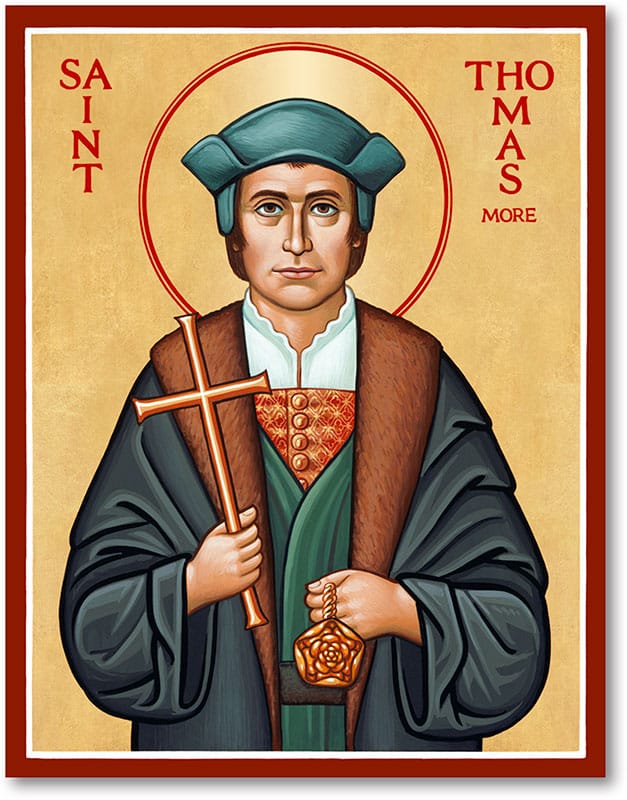
“For if you suffer your people to be ill-educated, and their manners to be corrupted from their infancy, and then punish them for those crimes to which their first education disposed them, what else is to be concluded from this, but that you first make thieves and then punish them.”
St. Thomas More, Utopia
St. Thomas More is venerated by the Roman Catholic Church. He was executed under King Henry VIII for refusing to consider Henry’s marriage to Ann Boleyn as a spiritually valid second marriage. He also continued to believe in Papal supremacy.
Not surprisingly, he was imprisoned in the Tower of London. But, while there he wrote the treatise Dialogue of Comfort Against Tribulation. He was executed on 06 July 1535. He recited Psalm 51 (Have mercy on me O God, according to your great mercy …) on the scaffold before his beheading. While he is not considered a saint by the Orthodox, there is much to admire in his life and his philosophy.
Besides being a very upright and moral man, in all the best senses of the words, he was also a social philosopher. The quote is from his book Utopia. And the quote is one that applies strongly to the situation in the USA today. Even back in the 1500s, early social philosophers had figured out that if you give a child a bad (or wrong) education, they are likely to grow up to be adults who then behave badly.
By the 1800s writers, such as Charles Dickens, began to use fiction to present us with the reality of a bad upbringing. In the pair of books, Oliver Twist and A Christmas Carol, Dickens shows us both sides of the upbringing. Who can forget Fagin and his gang of young pickpockets in Oliver Twist? Who can read about the miserable lives of the young children without feeling some pity for the only way they had to get money to eat and then for the advantage that Fagin took of them? Who cannot remember with horror that England hung children as young as 12? https://www.nationalarchives.gov.uk/education/resources/victorian-children-in-trouble/ Lest you think that this is only England and only back then in January 2001 a judge in Florida sentenced a 12-year-old to life in prison without parole. The child really was a criminal but the appeals court ruled that this was an inappropriate sentence. Finally in June 2012 the Supreme Court ruled that a minor may not be sentenced to life in prison without parole. That was only 8 years ago. Up until 8 years ago, a child as young as 12 could be sentenced to life in prison without parole.
Having shown what a wrong education could bring in Oliver Twist, Charles Dickens proceeded to show us what horrid results extreme poverty could have. Who can forget Tiny Tim whose father worked so hard for Ebenezer Scrooge? But, Scrooge did not pay a reasonable living wage. As a result, Tiny Tim’s father could not get the medical treatment for Tiny Tim that his son needed in order to live. Who cannot see today’s situation of USA medical care in this story from two centuries ago? We still have many jobs that do not pay a living wage, which is a wage sufficient to support a family with reasonable medical insurance. With the old Ebenezer Scrooge we seem to cry out, “Have they no refuge or resource? … Are there no prisons? … Are there no workhouses?” Then we dismiss them from our thoughts because, like so many of the Victorians, we are good Christian people.
But, let us return to St. Thomas More because often the saints are able to shed a clearer light on the subject. And it is in the quote above that St. Thomas makes clear what many claim today is a supposedly liberal point. But, as we can see from St. Thomas, it is not a liberal point but a godly Christian point. We cannot stop a child from having bad parents. But, we can ensure that a child has a good education and we can strive to have wage policies in which every child of a working parent can be assured of having their necessities. If we do not do this, then like St. Thomas and Mr. Dickens pointed out, “you first make thieves and then punish them.”
You see, what both the Saint and the secularist point out is that while there is a moral fault in the thief, all too often there is a moral fault in us, as well, for having allowed conditions under which a child’s psyche is twisted toward criminal behavior. Neither claimed that good social policies would eliminate all crime. Neither of them were so simple. Both recognized the evil that is found in human beings. But, what they did say is that crime is not as simple as saying that it is all “their” fault and we bear no responsibility in how many have turned out. As with Ebenezer Scrooge and Oliver Twist, there is an argument in both the Saint and the secularist that if we change our hearts and if growing children receive an adequate environment that the degree and quantity of criminal and immoral behavior can be drastically lowered.
Both argue that crime and bad behaviors are not simply them versus us. Rather, as Fr. John Donne’s book Devotions said, “No man is an Island, entire of it self; every man is a piece of the Continent, a part of the main.” (For those of you who do not know, Fr. John Donne was an Anglican cleric as well as having been a member of the English Parliament twice.)



Leave a Reply